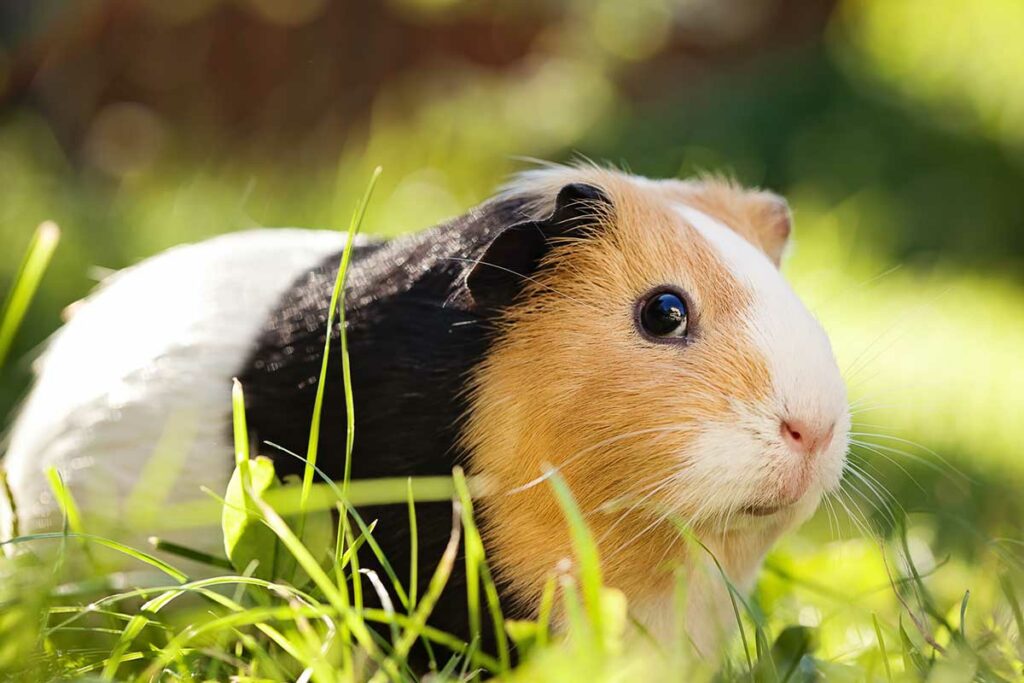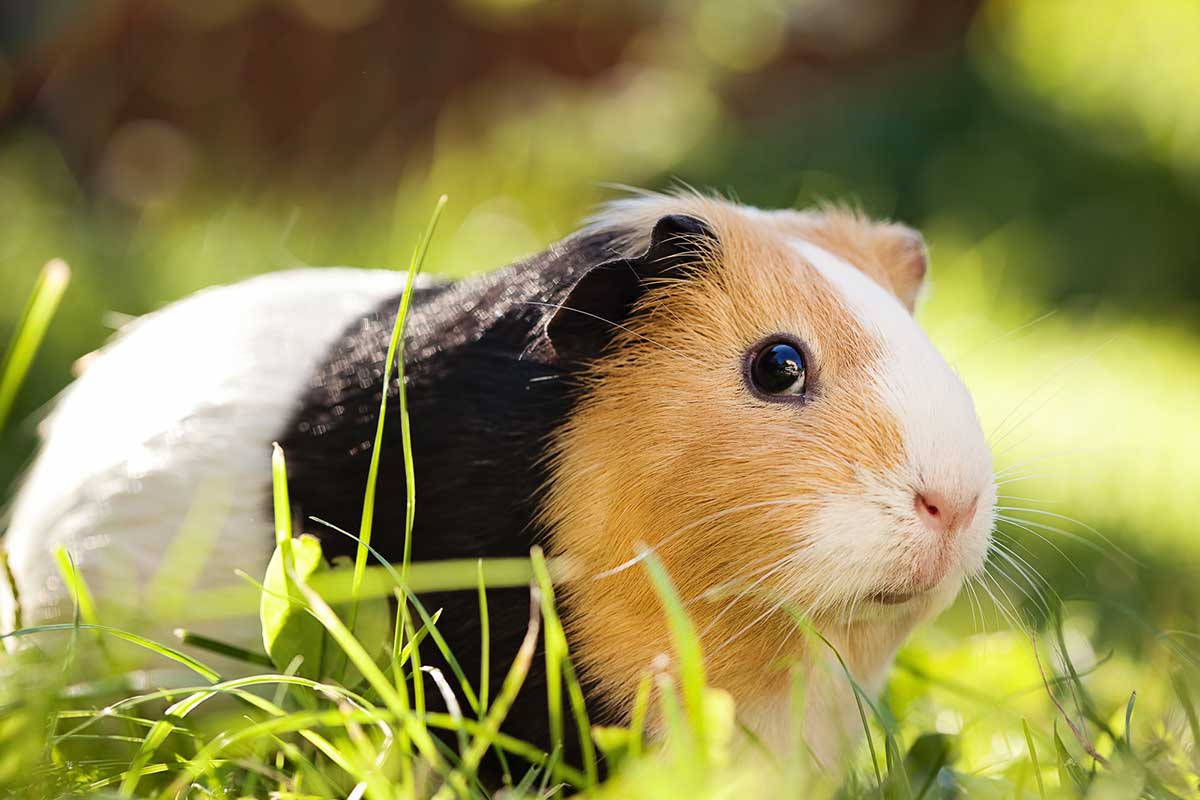Guinea pigs make fantastic pets — they’re cute, furry, affectionate, and relatively easy to look after for new pet owners. But guinea pigs aren’t as common as pets like dogs and cats, so it’s natural to have questions about what is “normal” for your guinea pig. One question we get a lot is whether guinea pigs hibernate.
Hibernation is often characterized as sleeping for the winter, and many small mammals, such as squirrels and chipmunks, do hibernate. But guinea pigs do not hibernate in the wild, and they also shouldn’t be hibernating in captivity.
In fact, guinea pigs don’t need much sleep at all and usually only sleep for about four hours a day. So, if your furry friend does start sleeping for extended periods of time, this is probably a sign that something is wrong.

Read on as we take a closer look at what hibernation is and why it’s something your guinea pig should never be doing. We’ll also look at how much sleep your guinea pigs need, and what factors might cause them to sleep more in certain circumstances. Finally, we’ll look at some medical conditions that can affect guinea pig sleep.
What Is Hibernation?
Many of us learned about hibernation by watching Yogi Bear stock up on picnic baskets and then tuck himself in for a long winter nap, only to wake up at the start of spring to make trouble again.
This is not as far from reality as it might seem. Hibernation is when certain animals enter an energy-conserving mode, which will leave them to sleep or remain mostly dormant for weeks or even months. This is a response to situations of scarcity or very bad weather, so it usually happens in the winter when there isn’t as much food around and it’s too cold and snowy to walk long distances in search of it.
Animals that live in conditions with periods of scarcity have evolved the ability to significantly reduce their metabolism, heart rate, and body temperature to conserve energy. They will either eat more than usual before hibernating and then go into hibernation with extra fat stores, or they’ll gather food to eat during the hibernation period, like squirrels do.
When they emerge from hibernation, these animals tend to be on the skinny side, but they are more or less unscathed by the physical and mental stress of hibernation.
Many reptiles hibernate. Bears are known to hibernate of course, and many small mammals not all that dissimilar from guinea pigs also hibernate, including squirrels, chipmunks, dormice, hamsters, hedgehogs, and bats.
Why Don’t Guinea Pigs Hibernate Then?
The wild ancestors of the guinea pigs live in warm climates in South America where food is plentiful for most of the year, so there was never an evolutionary necessity to develop the ability to hibernate.
When they were imported to Europe by the Spanish from the 16th century as pets, guinea pigs were kept in fairly cushy surroundings, so domestic guinea pigs have no more need to hibernate than their wild cousins.
But what about guinea pigs that are kept in cold climates? They’re popular as pets around the world, including where temperatures drop below freezing.
Well, evolution takes generations of breeding for desirable characteristics to emerge, so guinea pigs have not developed the ability to hibernate for extended periods, even in the cold.
This is why it is extremely important to keep your guinea pig’s habitat at the right temperature, because they have few strategies to cope with extremely cold conditions.
What Temperatures Should Guinea Pig Habitats Be?
Guinea pigs thrive in moderately warm temperatures between 65 and 73 degrees Fahrenheit (18-23 degrees Celsius). At night, they can manage slightly cooler temperatures, but they will begin to feel the chill if they’re in temperatures below 60 degrees Fahrenheit (16 degrees Celsius).
When temperatures do start to drop, your guinea pig may respond by becoming less active. This will mean more time sleeping and less eating. But this should not be considered a healthy response, like it is in the case of hibernation. Rather, this is an emergency response to extreme conditions.
Unlike rats and mice, who seem to be able to survive in all conditions, guinea pigs are very sensitive to changing habitat conditions. They can develop hypothermia or pneumonia and can die within a matter of days if exposed to excessive cold.
This is why it’s so important to monitor the temperatures in your guinea pig’s hutch or habitat with a dedicated thermometer so you know they’re at a safe temperature.
Symptoms of a negative response to cold include ears that are cold to the touch, labored breathing, discharge excreted from the nose and eyes, coughing and sneezing, and overall sluggishness. They will also shiver, a lot, and, if you have more than one, you’ll find them huddled together and curled up in the warmest areas of their hutch.
There are a lot of things you can do, though, even in colder climates, to keep your guinea pigs at the right temperature. It shouldn’t be too difficult since guinea pigs enjoy similar temperatures to humans.
The first thing is to place their hutch in the right spot. If it gets very cold where you are, you won’t be able to keep them outside and they’ll need somewhere more protected. Look for a reasonable indoor location where wind and other outdoor elements will have a minimal impact on their habitat temperature. Along with placing the hutch indoors, you can ensure the hutch itself is insulated to further protect against external cold.
You can also place blankets and other cozy bedding inside the hutch to capture and retain heat. This can also give your guinea pig something to snuggle against if you don’t have several guinea pigs that can snuggle together.
When it gets very cold, you can also use animal-safe heat pads such as these electric outdoor heat pads from K&H Pet Products, or these microwavable heat pads from Snuggle Safe.
Read our top tips to keep your guinea pig cool during a hot spell.
How Much Do Guinea Pigs Sleep?
Guinea pigs are very active animals and actually sleep very little. Your average guinea pig will only sleep for about four to six hours a day. And rather than sleep for extended periods, they sleep in a number of 15- to 30-minute bursts throughout the day.
Guinea pigs tend to get most of their sleep at night and are more active during the day, so some pet parents may feel like they never see their furry friend at rest. They don’t always close their eyes when they sleep, so you might not be immediately aware even when they are sleeping.
But guinea pigs will also sleep with their eyes closed if they feel safe. It’s not uncommon to see domestic furballs sleeping with eyes closed.
These sleeping patterns, which may seem strange to us, is an evolutionary strategy to deal with an environment where guinea pigs have many larger predators and need to stay alert most of the time. It’s usually a drop in temperature that signals to them that it’s safe to sleep, because their predators are less active as it gets colder.
Guinea pigs don’t lie down when they sleep but rather stay alert on their feet. So if you see your guinea pig lying on their side or their back for an extended period, this is a cause for concern.
Lethargy, which may sometimes appear like sleeping more than usual, can be a symptom of various medical conditions. If it lasts for more than a few days, it may be worth a trip to the vet.
Guinea Pigs And Hibernation FAQs
How do I know if my guinea pig is hibernating?
Guinea pigs don’t hibernate, so if they display signs of hibernation such as loss of appetite and reduced breathing, this is probably a clue that something is wrong and you may want to visit the vet.
If your guinea pig seems like it might be trying to hibernate, check the temperature in their habitat and ensure it’s above 65 degree Fahrenheit. If it is, and they are still behaving strangely, call your vet.
What do guinea pigs do when they’re cold?
When guinea pigs get cold, they will try and warm up. This usually means huddling together to share body heat, or nesting in blankets and similar materials if they are on their own.
They will likely become less active, as they instinctively know that their predators are also less active in the cold and therefore it can be safe to take a pause. They will also have involuntary bodily reactions to warm up, such as shivering.
Remember that your guinea pig is not adapted to survive for long in temperatures lower than 60 degrees Fahrenheit, so if they are feeling the cold, try to warm up their habitat.
Why is my guinea pig not moving?
Guinea pigs are active animals that tend to be chewing and playing for around 20 hours a day. A sudden drop in activity level is usually a sign that something is not quite right. This kind of lethargy and withdrawal is associated with several medical problems, from simply sulking to kidney failure. Try to identify other symptoms and contact your vet.
Do guinea pigs sleep more in winter?
Your guinea pigs may sleep a little more in winter. For example, they may get six hours of sleep a day in winter and only four in summer. But you may not notice this as guinea pigs do not sleep for solid blocks. Rather, they take “cat naps” in 15- to 30-minute intervals. Guinea pigs do not hibernate, and if they start to sleep excessively, this is generally a sign that something is wrong.
Why did my guinea pig die overnight?
Guinea pigs are very sensitive creatures and can struggle to adapt to sudden changes in their environment. If your guinea pig died overnight without warning, it was probably a heart attack or stroke as a result of a sudden drop in temperature that they could not cope with.
Guinea pigs should be kept in temperatures between 65 and 73 degrees Fahrenheit, and their habitat temperature should never fall below 60 degrees, even overnight in winter.
Should guinea pigs be covered at night?
Guinea pigs are active at night and they are also social creatures that like to know what’s going on outside their enclosure, too. But if their habitat is indoors, it should still be at least partially covered at night.
To thrive, they need distinctive periods of day and night, and their nighttime period can be disrupted by the noise and light pollution that are common in most homes after sunset.
Sleeping With Your Guinea Pig
While you may love your guinea pig dearly, you should never let them sleep in the bed with you! This is not least because they are very active at night and will likely disturb your sleep. They also need to pee and poop often, so they will likely make a mess in your bed. There is also the danger that you might roll on top of them and hurt them.
Keep your guinea pig happy by creating a nice habitat for them, which is just the right temperature and has plenty of places for them to snuggle when they do want to get 40 winks. But be prepared to see your guinea pig active most of the time.
Read our complete guide for caring for a guinea pig.
- Can Guinea Pigs Eat Potatoes? Foods To Avoid - September 24, 2023
- Can Guinea Pigs Eat Carrots? Feeding Advice - September 23, 2023
- How To Make A DIY Bearded Dragon Enclosure - September 22, 2023

